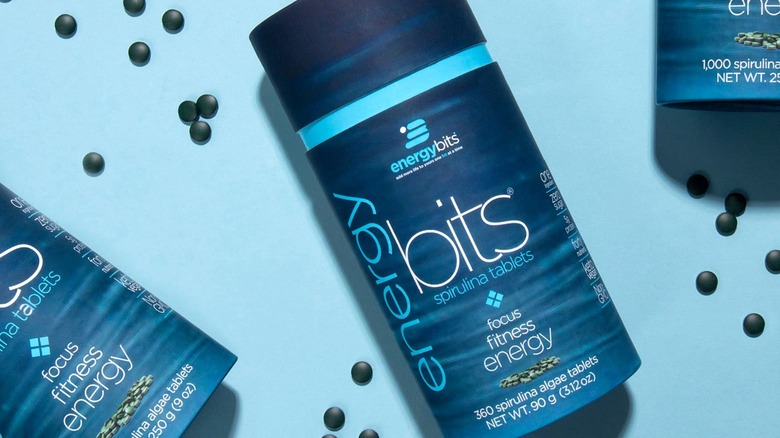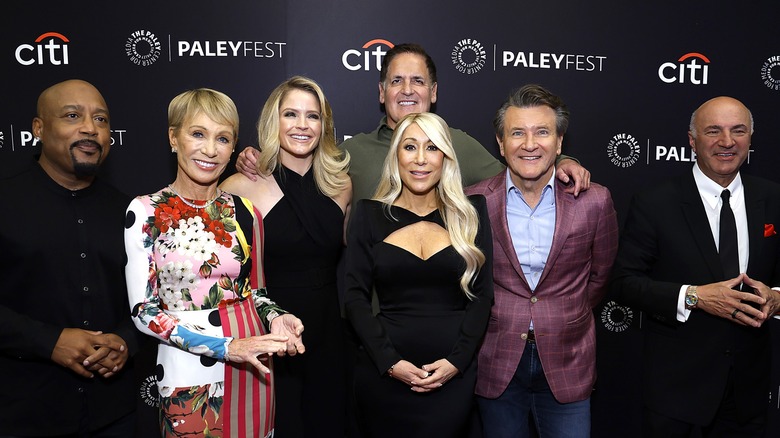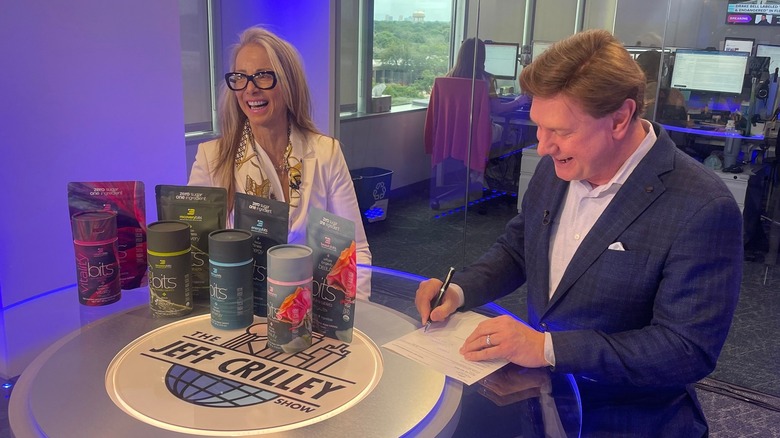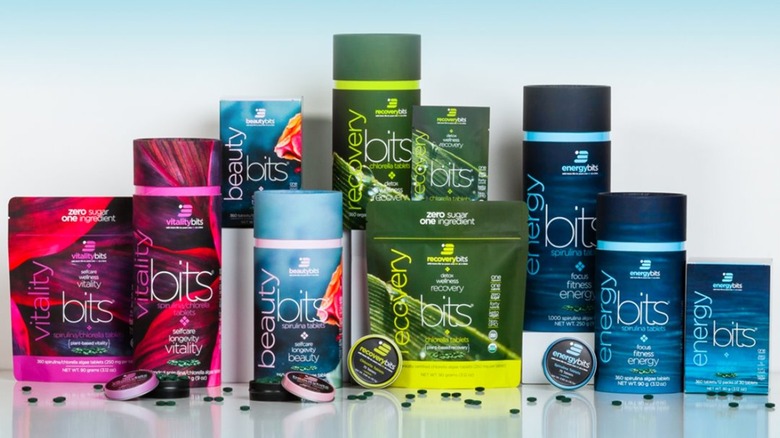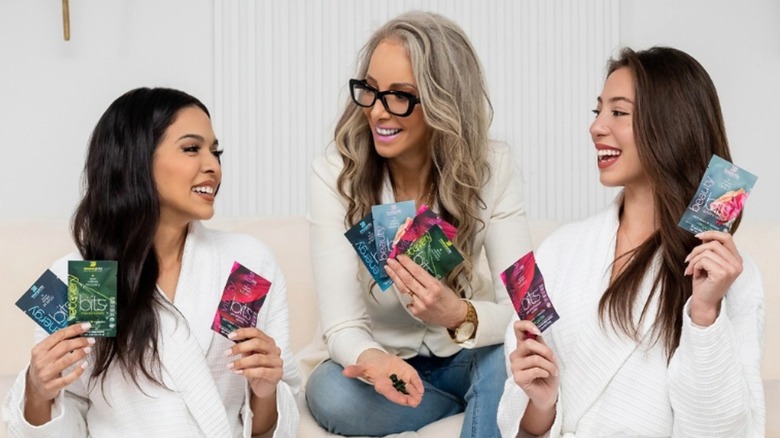ENERGYbits: Here's What Happened After Appearing On Shark Tank
People sometimes look in the places you would least expect for new ways to improve health. Catharine Arnston did just that when her sister was diagnosed with breast cancer. In her attempt to research healthy foods that might help her sibling overcome her disease, she began looking into the wellness advantages that are sometimes associated with plant-based foods. Her sister's oncologist reportedly pointed them in the direction of alkaline foods. Her journey led her to, of all things, algae.
After discovering that algae was alkaline and thought by some to have potential health benefits but wasn't yet sold commercially with any success in the United States, Arnston decided that would be her new mission in life. She eventually created ENERGYbits, a small pill supplement made solely from algae. Over six years, she was able to sell roughly $1.5 million worth of her product, although any profits made were reinvested into the business. In need of capital and, perhaps, someone to guide her through the steps it would take to make ENERGYbits a household name, Arnston made her way to ABC's "Shark Tank."
What happened to ENERGYbits on Shark Tank?
Once in the tank, Arnston began her pitch by stating how algae had long been overlooked as a beneficial superfood. She showed the sharks her snazzy packaging and gave them some information about the potential health benefits of algae, but she ended her pitch prematurely. Prompted by investor Daymon John with a, "Um, you forgot something" (via Hulu), she stated that she was seeking $500,000 for 5% equity in the company — a whopping $10 million valuation of her company.
Robert Herjavec liked the taste of the pill, but he was an outlier in that regard. The rest of the cast looked as though they wanted to spit it out, with John exclaiming, "Oh, that's nasty!" Things continued to go downhill for Arnston from there.
All the sharks considered the company's valuation ludicrously high, considering it wasn't profitable yet. Mark Cuban was skeptical about the health claims she was projecting, as was Lori Greiner. Greiner pointed out that one of the three variations of the product, SKINNYbits (which was the exact same formula as ENERGYbits with different packaging), was implying just with the name that it would help folks lose weight, with no way to prove that. Arnston insisted the company would succeed in retail because she had done so well with the branding, but the sharks remained unconvinced.
During a rant contending she would succeed no matter what, Arnston let a no-no word for primetime television slip and quickly put her hand over her mouth in shock. The sharks all loved it, with Daymon saying, "Now I like her." Still, he may have liked her, but he didn't like the product. Every shark bowed out, and Arnston left without an investor.
ENERGYbits After Shark Tank
Arnston didn't let the setback of not securing the backing of a shark stop her from pursuing her dream of making ENERGYbits a global commodity. She appeared on multiple podcasts promoting ENERGYbits and partnered with a non-profit that assists cancer patients facing financial struggles, Family Reach. She continued to try to get retailers to put the product on their shelves and found some success in that regard, as certain companies including Walmart and Neiman Marcus began selling it in-store.
"Shark Tank" might have been helpful here, despite never securing an investment from them. Even when someone doesn't make a deal on the show, their product may benefit from the publicity of merely making an appearance, as illustrated by KidsLuv when it came on "Shark Tank" and also failed to seal a deal. Although the sharks didn't care for ENERGYbits, other nutritionally like-minded folks who saw the product for the first time were curious. Arnston was also relentless in promoting the product, and although it is difficult to say if ENERGYbits is a profitable company, it is still selling algae pills to people inclined toward all-natural health supplements.
Is ENERGYbits still in business?
Some stores may still be selling ENERGYbits in brick-and-mortar locations, but it appears that Amazon and the ENERGYbits website carry the bulk of sales. The products sold have gone through some rebranding as well. SKINNYbits is no longer around (perhaps Greiner's warning about the duplicitous label was taken to heart), but a similar variation, BEAUTYbits, has taken its place. It joins ENERGYbits, VITALITYbits, and RECOVERYbits as the four products currently offered through the website.
However, the company is not without its controversies. Some scientific outlets have claimed Arnston is selling snake oil, as her claims of the advantages of ingesting algae have not been proven beyond a shadow of a doubt (per Journal of Applied Phycology). To that end, an article from the American Council on Science and Health eviscerated the product and Arnston's lack of credible citations concerning the health benefits of algae when she was on "Shark Tank." Yet, none of that has stopped Arnston from continuing to get the word out about what she says are the overlooked health advantages of algae.
What's next for ENERGYbits?
Arnson shows no signs she is slowing down when it comes to promoting ENERGYbits to the masses, with active social media accounts currently still advocating the product. However, even though the company has expanded since her appearance on "Shark Tank," some folks who have worked for her aren't thrilled about her management style. On the company review site Glassdoor, Arnston has a 67% favorability rating as CEO, with some expressing concerns that the company ethos prizes ambition over everything else.
When she was on the show, Kevin O'Leary bluntly asked her how long the company would have to fail to "take it behind the barn and shoot it" (via Hulu), to which Arnston replied that would never happen. Only time will tell. It might not be long before you see ENERGYbits on the shelves of every major retailer in the country. Yet, it could be just as likely that the company ends up like Peekaboo Ice Cream after its appearance on "Shark Tank" with no investor and a business strategy that failed despite all the hard work put into making it a success.
